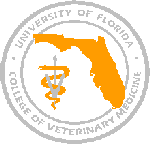 Research Support for Degenerative Myelopathy
Research Support for Degenerative Myelopathy Research Support for Degenerative Myelopathy
Research Support for Degenerative MyelopathyDegenerative Myelopathy may be a unique neurodegenerative disorder of certain breeds of dogs. The most common breed affected is the German Shepherd dog. Other breeds which have been confirmed to have the same disease process first recognized in German Shepherds are the Belgium Shepherd, Old English Sheepdog, Rhodesian Ridgeback, Weimaraner and, probably, Great Pyrenees. While other dog breeds may have DM as described German Shepherds, confirmation is lacking. Some breeds have a chronic progressive spinal cord problem which is not DM of German Shepherd dogs. The group may include Boxer Myelopathy. As yet, little work has been done to determine other causes of myelopathy.
Since DM is a unique disease affecting one to three percent of German Shepherds, it is an orphan disease. In the German Shepherd dog, DM represents between 14,000 to 42,000 affected dogs each year in the United States. While this is a lot of dogs, it is less than 0.1 percent of all dogs. Certain features of DM are similar to one of two human diseases, Multiple Sclerosis. Other pathologic features fit Amyotrophic Lateral Sclerosis. As such, DM may not be a good animal model of a specific human disease, rather a model of neurodegenerative disease, in general. On the other hand, MS appears to be a good model of DM. The immunologic factors which lead to DM appear to be very closely related to those for MS. Treatments of MS affect DM in the same way.
Funding for the work performed here at the University of Florida has largely been through donor contributions. The major funding agency for medical related research, the National Institutes of Health, does not fund animal research, only research on animals to advance the understanding of human disease. Therefore, while our research has benefited from NIH funding of MS research, it has not received direct funds from NIH to support the research to date. We continue to depend upon the generous contributions of people concerned about the development of DM in their pets or their friend's pets. We have accomplished much, but there is much remaining to do.
Our work has led to the realization that DM is an auto-immune disease, where the body attacks the dogs nervous system, leading to DM. We have begun to develop treatment strategies which are effective (particularly, early in the disease) to combat the advance of the disease and to allow many patients to live their normal lives without signs of the disease. Recently, we have proposed prevention strategies which may reduce the incidence of DM in the future. We have developed better diagnostic criteria and recently discovered a method of detecting the probability of DM using acetylcholinesterase levels in CerebroSpinal Fluid. While we continue to look for serum markers, elevations in CSF acetylcholinesterase concentrations appears to be a reliable indicator of inflammation in the central nervous system. Coupled with clinical signs, this improves the accuracy of DM diagnosis.
We still need your help! We know that DM is associated with changes in inflammatory proteins and altered immunity. We now need to determine now these proteins become abnormal so that we can repair or prevent this damage. Proteins are begat from ribonucleic acid (RNA), which is begat from deoxyribonucleic acid (DNA). We postulate that the healing capacity of DM patients was overcome, leading to damaged DNA and the development of disease. Further, we feel that by investigating this damage, we can unlock the potential for these patients to recover. You can help by contributing to this research effort.
The University of Florida has a tax-deductible, charitable foundation (The University of Florida Foundation) whereby you can contribute your support. Within the Foundation, we have two DM-related funds. One fund directly provides research money to Dr. Clemmons' laboratory. The second is an Endowment which also supports the research through application of interest derived from the prinicple. This Endowment will be used to develop a training program, to continue to train veterinary neurologic scientists in the area of neurodegenerative diseases. We need your help to fund our current work and to train additional scientists who will carry on this work in the future.
If you would like to contribute (no amount is too large or too small), you may contact Ms. Karen Legato, Senior Director of Development, College of Veterinary Medicine, Box 100125, HSC, University of Florida, Gainesville, FL 32610-0125, by E-mail at LegatoK@ufl.edu, or by phone at (352) 392-4700 ext. 5200.
Thank you for your generous support,
R.M. Clemmons, DVM, PhD
Associate Professor of Neurology & Neurosurgery
Copyright University of Florida 1997
All Rights Reserved
Updated last on 27 August 2002